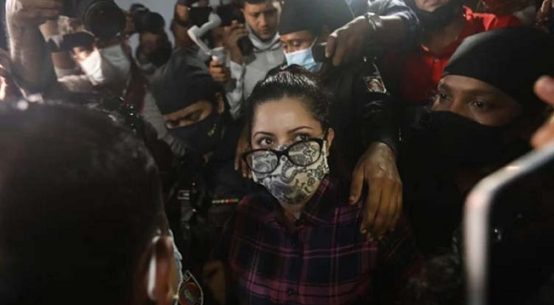
Tuesday marks the 48th death anniversary of Bangladesh’s national poet, Kazi Nazrul Islam, who was unanimously revered as the rebel poet’ and a pioneer for his enormous contributions to Bengali literature.
However, even after 52 years of independence and 47 years after his passing, the benevolent poet is yet to be gazetted as the ‘National Poet’ of Bangladesh, pointed out by several Nazrul-Sangeet artists, scholars, and enthusiasts who demanded the declaration of Nazrul as the ‘National Poet’ of the country.
Commemorating the life and works of the great poet, people from all walks of life, including his family members, and different educational, social, cultural, and political organisations paid floral tributes to the poet’s tomb beside the Dhaka University central mosque on Tuesday.
Different cultural institutions, including Bangladesh Shilpakala Academy (BSA) and Bangla Academy, placed floral wreaths on the poet’s graveyard on Tuesday. Bangla Academy held a seminar and cultural event at the academy in the morning; however, many other cultural institutions, including BSA and Chhayanaut, have been unable to hold commemorative events on the poet’s 48th death anniversary due to the recent flood disaster and the state of reformation in the country.
Bangladesh Television, Bangladesh Betar, and different television channels-radio stations are broadcasting special programmes marking the 48th death anniversary of the poet, including drama, musical shows, and discussions.
The President of the newly independent republic of Bangladesh, Sheikh Mujibur Rahman, invited Kazi Nazrul Islam to settle in Dhaka on May 24, 1972, with the permission of the Government of India. In 1972, the Bangladeshi government announced him as the ‘National Poet’; however, no formal gazette was released in response to the announcement.
During his stay in Bangladesh in February 1976, he was conferred Bangladeshi citizenship and an Honorary D.Litt. from the University of Dhaka in 1974, as well as the Ekushey Padak in 1976.
Demanding the official gazette on Nazrul’s status as the ‘National Poet’, renowned Nazrul singer Salahuddin Ahmed said, “His status as our ‘National Poet’ is general knowledge; however, no official notification or any other document regarding declaring Kazi Nazrul Islam as the national poet has been found anywhere, which is very shameful for our nation.”
Emphasising the importance of such official recognition, prominent Nazrul singer Ferdous Ara said, “Certifications and official documentation are required to establish any claim. A formal recognition is essential to secure Nazrul’s legacy and status as our great national poet.”
Born in Churulia village of Bardhawan in West Bengal, India, in 1899, Kazi Nazrul Islam had a brief 21-year literary career, during which he produced 2,600 songs, 600 poems, three books, and 43 essays, according to the Kabi Nazrul Institute.
Within a few years of beginning his military service in the British Army in 1917, Nazrul embarked on his literary career. He wrote his cult classic poetry “Bidrohi” (The Rebel) in 1921 and founded “Dhumketu” (The Comet), a monthly journal, in 1922.
Due to his frequent nationalist involvement in the Indian Independence Movement, Nazrul found himself in the clutches of colonial British authorities. Freedom, humanity, love, and revolution are recurring themes throughout Nazrul’s remarkable literary creations, and his works later inspired the Bengali netizens during the 1971 liberation war.
Nazrul also published short stories, novels, and essays, although his songs and poems have received the most praise from critics. He is renowned for his liberal use of Arabic and Persian terms in his writings and for popularising Bengali Ghazal melodies.
He invented his musical genre known as “Nazrul Geeti,” which consists of almost 4,000 songs he penned and composed the music for, many of which were released on vinyl and HMV records.
When Nazrul was 43 years old and suffering from an unidentified illness, he started to lose his voice and his memory. His condition was later discovered to be “Pick’s disease,” a rare and fatal neurodegenerative disease, by a medical team in Vienna.
The revered poet breathed his last on August 29, 1976 (12 Bhadra of Bangla calendar year 1383) at the then PG Hospital (now Bangabandhu Sheikh Mujib Medical University Hospital), in Dhaka. He was buried with state honour beside the Dhaka University central mosque.

